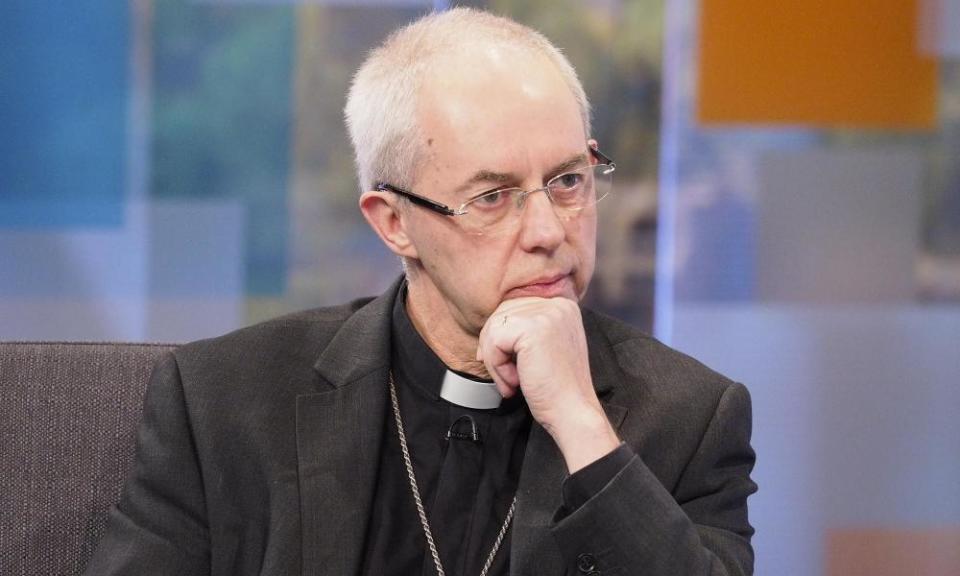Archbishop of Canterbury calls on corporations to stop avoiding tax

The archbishop of Canterbury has called for corporations to stop using aggressive tax avoidance schemes that deprive society of money that should be used for the “common good”.
Speaking on Radio 4’s Today programme, which was broadcast from Lambeth Palace, the archbishop’s London home, Justin Welby said the tax system was not working properly if a company “that has a turnover of several billion … pays only a few million in tax.”
“The tax system should ensure that those who benefit from a society pay to that society properly,” said Welby.
During the discussion, the archbishop looked back over the events that marked British society during 2017.
Alongside Brexit, the inferno at Grenfell Tower, and the next royal wedding, Welby chose to highlight tax fairness, saying “something isn’t quite working”.
Asked whether multinational companies should pay more tax, Welby replied: “I think it is the right thing. Everyone knows you can be more or less aggressive in your tax planning.”
His comments came one month after the November publication of the Paradise Papers, a leak of 13m files which exposed the offshore financial dealings of some of the world’s wealthiest individuals and corporations.
“It is clear that a company that has a turnover of several billion and yet pays only a few million in tax, something isn’t quite working there,” Welby said.
“It is to do with transfer pricing, there are all kinds of explanations, but people who earn money from a society should pay tax in that society for the common good, for economic justice.”
The archbishop, who was an oil industry executive before joining the church, is a vocal supporter of financial reform. In September, he described Britain’s economic model as broken, with a widening gap between the richest households and the rest of society.
The archbishop also called for a “ceasefire from insults” in British politics in order to make a success of leaving the European Union.
“It would be very good to have a ceasefire from insults and the use of pejorative terms about people at this time,” said Welby, who backed remain in the Brexit referendum.
“As a country we have a future ahead of us. We’ve made a decision about Brexit. That is clear. Both sides are saying that. How we do that is a question for robust political argument.
“But there’s a difference between disagreeing and personalised attacks, and those have to be avoided. Because if we’re going to make a success of Brexit … then we need a political leadership that is united in their attitude to the future even if divided on policy. And therefore we do need reconciliation and unity.”
The archbishop said there was “a very profound movement across every part of our society, across every part of politics, that says: yes, it’s very good that our economy is growing, it’s very good that unemployment is low, but that must be accompanied by things that demonstrate the value of human beings.”
He cited positive moves such as the government’s “living wage” and greater understanding of mental illness.
Welby, who was due to give a blessing at a memorial service for the victims of the Grenfell Tower fire at St Paul’s Cathedral on Thursday, said the tragic event had shown that “there was less attention being paid to the people of Grenfell Tower and similar buildings than to others in more prosperous areas”.
But he added that the response of communities in the aftermath of Grenfell and of the terror attacks at London Bridge, Westminster and Manchester Arena this year was a source of hope. “The fact that people were horrified … that this should happen in a tower block in London [and] a sense that this is wrong” was comforting, he said.
Asked about recent statistics revealing that more than half of the UK’s population say they have no religion, and fewer than a million people regularly attend Anglican churches each week, Welby said the church was “doing more in society than for a long time”, citing activities such as night shelters and food banks.
The church was reforming and becoming much more focused, deliberate and purposeful, he said.
Asked about the church wedding next year of Prince Harry and Meghan Markle, Welby said the event was “no tickbox exercise”, and that the couple had a “profound sense of commitment” to faith and to each other.
He declined to say whether he would officiate at the wedding, as it was a decision for the couple.

 Yahoo News
Yahoo News 